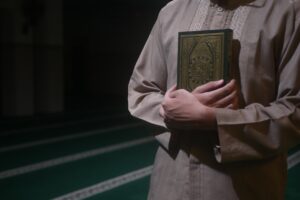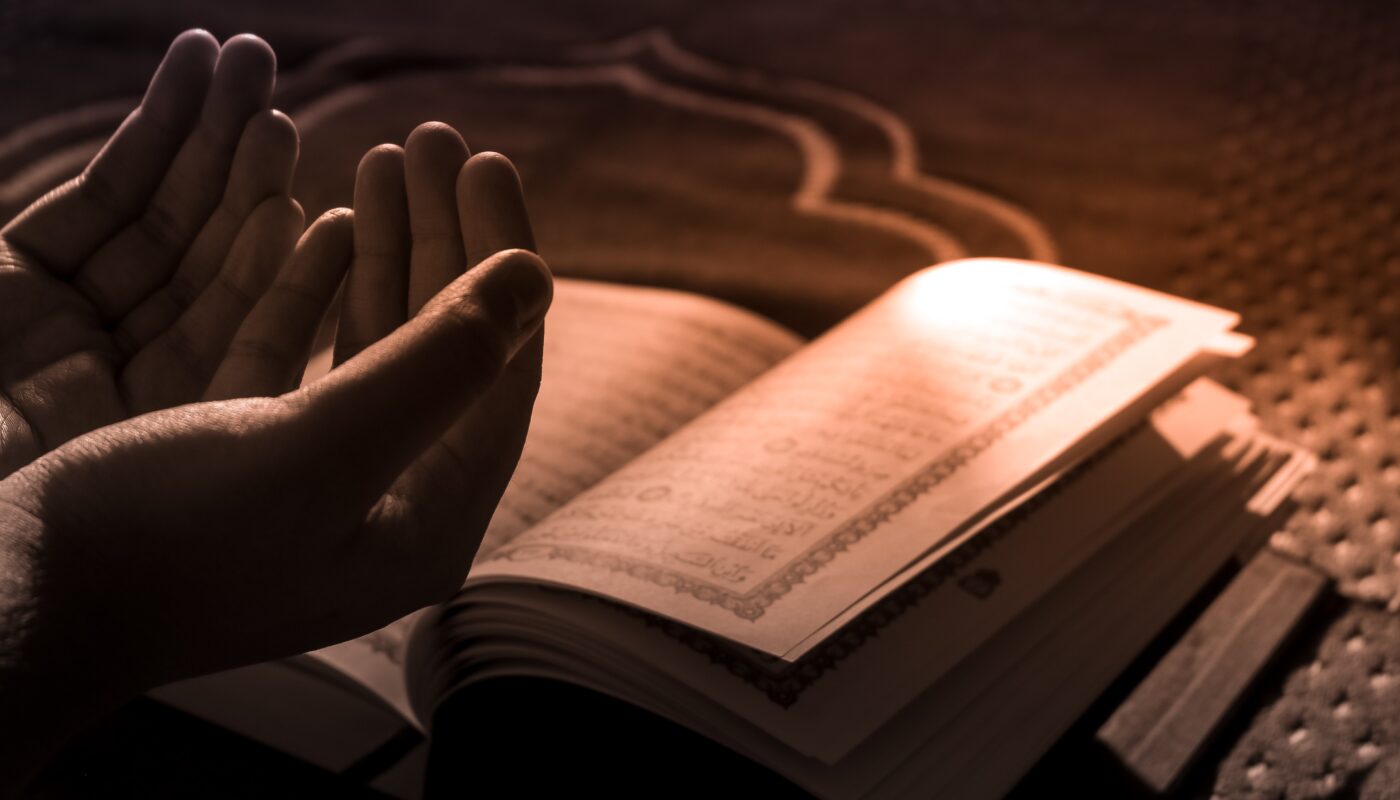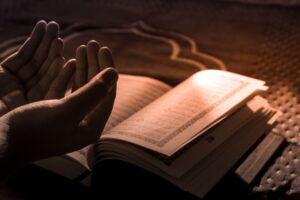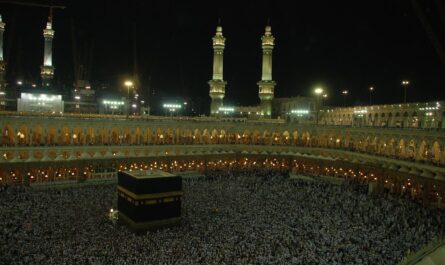The Five Pillars of Islam

The Five Pillars are the core beliefs and practices of Islam:
1. Profession of Faith (shahada).
The belief that “There’s no god but God, and Muhammad is the Messenger of God” is central to Islam. This expression, written in Arabic, is often conspicuously pointer in structure and a field of items, including the Quran, Islam’s sacred book of favored openings. One becomes a Muslim by describing this phrase with satisfaction.
2. Prayer (salat).
Muslims pray looking Mecca five times each day at dawning, noon, mid-afternoon, evening, and after dark. Prayer includes a recital of the opening chapter (surah) of the Qur’an, and is occasionally fulfilled on a small rug or mat used especially for this objective. Muslims can pray independently at any position or together during a mosque, where a pacesetter in prayer (imam) guides the congregation. Men assemble in the mosque for the afternoon supplication on Friday; ladies are welcome yet not expected to share . After the prayer, a homily focuses on a path from the Qur’an, supervened by prayers by the imam and a talk of a unique spiritual matter.
3. Alms (zakat).
In agreement with Islamic constitution, Muslims contribute a fixed portion of their earnings to neighborhood components in needfulness. Numerous autocrats and well-off Muslims make mosques, drinking wells, hospitals, academes, and different foundations both as a religious duty and to secure the blessings consorted with almsgiving.
4. Fasting (sawm).
During the daylight of Ramadan, the ninth month of the Islamic timetable, all healthy grown-up Muslims are needed to hesitate from food and drinkable. Through this short-term privation, they renew their observation of and gratefulness for everything God has handed over in their lives — including the Qur’an, which existed first told during this month. During Ramadan they partake the thirstiness and hunger of the poor as a dedication of the strict obligation to help those less lucky.
5. Pilgrimage( hajj).
Each Muslim whose good and finances certify it should make no lower than one visit to the holy town of Mecca, in current- day Saudi Arabia. The Ka’ba, a square design covered in dark weaved hangs, is at the focal point of the Haram Mosque in Mecca. Muslims accept that it’s the house Abraham (Ibrahim in Arabic) answered for God, and face toward its (qibla) when they supplicate. Since the hour of the Prophet Muhammad, enthusiasts from everyplace the world have accumulated around the Ka’ba in Mecca on the eighth and twelfth days of the last month of the Islamic schedule.
MUSLIMS SIX BELIEF IN ISLAM
Muslims have six fundamental convictions.
• Faith in Allah as the unparalleled God
• Faith in holy messengers
• Faith in the heavenly books
• Faith in the Prophets…
for example Adam, Ibrahim (Abraham), Musa (Moses), Dawood (David), Isa (Jesus).
Muhammad (peace be upon him) is the last prophet.
• Faith in the Day of Judgment…
The day when the existence of each individual will be surveyed to conclude whether they go to paradise or hellfire.
• Faith in Predestination…
That Allah has the knowledge of all that will occur.
Muslims accept that this doesn’t stop individuals settling on free decisions.
The accompanying six convictions are those that are normally held by Muslims, as spread out in the Quran and Hadith.
1. Belief in the Oneness of Allah:
Muslims accept that Allah is the maker, everything being equal, and that Allah is almighty and all-knowing. Allah has no replacements, no race, no course, no body, and is unaffected by the qualities of human existence
2. Belief in the Angels of Allah:
Muslims put stock in heavenly messengers, inconspicuous creatures who love Allah and complete Allah’s requests all through the universe. The angel Gabriel conveyed the amazing disclosure to the prophets.
3. Belief in the Books of God:
Muslims accept that Allah uncovered blessed books or sacred writings to some of Allah’s couriers. These Holy Books, the Quran ( given to Muhammad), the Torah ( given to Moses), the Gospel ( given to Jesus), the Spirituals ( given to David), and the Scrolls ( given to Abraham). Muslims accept that these previous sacred writings in their unique structure were supernaturally uncovered, however that main the Quran stays as it was first uncovered to the prophet Muhammad.
4. Belief in the Prophets or Messengers of Allah:
Muslims accept that Allah’s direction has been uncovered to mankind through uncommonly named couriers, or prophets, since forever ago, starting with the main man, Adam, who is viewed as the primary prophet. 25 of these prophets are related to by name in the Quran, including Noah, Abraham, Moses, and Jesus . Muslims accept that Muhammad is the rearward in this line of prophets, sent for all humanity with the message of Islam.
5. Belief in the Day of Judgment:
Muslims accept that on the Day of Judgment, people will be decided for their activities in this life; the individuals who followed Allah’s direction bearing will be paid with paradise; individualities who excused God’s title will be rebuked with fire.
6. Belief in the Divine Decree:
This statement of belief resolves the topic of Allah’s will. It tends to be communicated as the conviction that everything is administered by divine declaration, in particular that whatever occurs in one’s life is predetermined, and that devotees ought to react to the fortunate or unfortunate that comes upon them with appreciation or tolerance. This idea doesn’t nullify the idea of “choice;” since people don’t have earlier information on God’s declaration, they in all actuality do have opportunity of decision.
Major Sources of Islam
The two major fountains of the faith of Islam is the Quran and Hadith. These two are where the adulthood of the training approach from. When seeming for advice, a Muslim frequently refers back to one of these two in ordering to instruct themselves on a content.
The Quran is the central religious textbook of Islam. It represents the fountainhead of Divine guidance for every Muslim. The Islamic holy book is the words of God and existed called to Muhammad, the prophet of Islam, by the Archangel Gabriel and was written down in Arabic. The chapters in this book communication upon all sides of mortal reality, containing contents of doctrine, sociable association, and legislation. The Quran confirms the exposures given to earlier Prophets, though these might not be popular to us, in the conformation they were initially unveiled. The most sublime language and a rational communication that straight appeals to the mortal heart have caused this Divine book to move states and societies. It’ll remain to lead those who turn to Allah with a sincere heart, for all moments.
Hadith’s are a library of traditions holding words/ behavior of the Prophet Muhammad that, with records of his day-to-day practice (the Sunnah), form the major source of guidance for Muslims piecemeal from the Quran. During the initial many decades after the Prophet Muhammad’s death, those who directly knew him ( known as the Companions) participated and composed quotes and stories communed to the Prophet’s life. Inside the soonest two centuries after the Prophet’s passing, researchers led a nitty gritty audit of the tales, laying out the foundations of each statement alongside the movement of storytellers through whom the statement was given over.
Those which weren’t provable were supposed “ weak” or indeed “ fabricated,” while others were supposed “ certifiable” (sahih) and re-collected into quantities. The most certifiable libraries of hadith include Sahih Bukhari, Sahih Muslim, and Sunna Abu Dawood. Then’s an exemplar of the difference between guidance from the Quran, and advice from Hadiths.
In the Quran, there will be a verse from God that will state/phrase “ All Muslims must supplicate five times a day.” Still, from all of the assemblages of Hadiths we’re showed on how we’re make to perform our prayers. The hadiths carry us a by- deepness procedure for every move of the prayer from start to end. Whereas in the Quran we were purely ordered to do the prayers.






